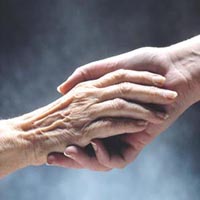
How to Prepare For Grief From a Special Loved One
If a special loved one of yours has just passed, grief may either hit you like a ton of bricks or it may creep up on you slowly, seemingly coming out of nowhere days or weeks later. Is there a way to prepare for that grief when it comes? You can take steps to prepare, but there really is no planning for when and how it will hit you. After all, your special loved one was very near and dear to your heart. Learning to live without them can be challenging, both emotionally and physically. Bereavement services in San Mateo and elsewhere can act as an anchor for when the grief sets in, making sure you don’t float too far offshore.
Grief is a natural process, and most of us go through it in some form or another. It’s profoundly distressing and painful, to be sure, but sometimes, we know in advance if our loved one is reaching the end of their life. When this happens, grieving can begin, at least in part, before the death occurs. Planning ahead for this overwhelming time can also serve to ease practical issues that may surround the eventual death, thereby reducing the complications that come with those first hours and days after loss, says PsychCentral. Taking action in advance is a comfort to many, as they are better able to cope with the loss even in some small way.
How to Prepare
Heed these tips to prepare for grieving the loss of a special loved one.
- Build a network: Gather those you care about the most and those who care about you. From family and friends to neighbors and colleagues, reach out to let them know what you’re going through and that you will need their support. It’s important to know when to ask for help so you aren’t always alone with your grief. When you treat bereavement as a normal topic of conversation with your support system, you can learn to have those conversations without any discomfort or fear.
- Treat yourself well: As much as you may not feel like eating or getting exercise, try to do the best you can. Taking care of yourself is paramount to recovery after loss. Eat well, get enough exercise, and get rest when you need it. It’s easy to overlook your own physical health when grappling with grief. It may not be easy to get restful sleep. It’s common to be lethargic and fatigued during the day, and you may feel tense all the time. Give yourself a break and permission to heal.
- Plan the financial and legal aspects: One big thing you can do to plan for the bereavement period is to make sure all the financial and legal aspects are taken care of before the death if possible. Without these issues in the way, you won’t feel as overwhelmed and can focus on healing, not dealing with lawyers or financial planners.
- Take time off work: Tell your boss what you’re going through and take the time you need, whether that’s through unpaid leave, sick leave, personal time, or through FMLA. The last thing you need is to worry about calling in to work each day or worrying about deadlines.
- Prepare your kids: Your kids know something is up, so talk to them about it in terms that are appropriate for their age. Tell them how things may change, that you may seem sad for a while, and that it’s not their fault. If they need it, bring them to a counselor, as they could be going through their own grieving process that they’re not talking about.
- Accept your grief: Know that you will grieve for a long time, possibly forever. But it won’t always be this intense. “Grieving” comes from the Latin word “gravis,” meaning “heavy.” When we lose someone we love, we carry the burden of a heavy heart, not just for the special person we lost but for ourselves who are alone, without them. The living grieve for the dead, says Psychology Today, but they also grieve for the part of themselves that has “died” along with their spouse, parent, partner, or child. Loss is about how you experience the absence of those you love and the way in which you process the emptiness you feel when they are no longer here to define you.
Getting used to the idea of loss can take time. Don’t rush the grieving process, or force yourself to hold back your emotions. Grief isn’t a simple thing. It’s a complex emotion that comes and goes in waves. It’s common to go between talking rationally about the loss and your special loved one, and breaking down in front of a friend when it all gets to be too much. Then, you may switch back to resourceful mode and power through the next few days.
There are no rules, and there are no hard and fast ways to plan for grief. You have to let yourself go through it, riding the waves, with your support system behind you.
Contact Pathways Home Health and Hospice
From grief counseling and support groups to memorials and workshops, you are never alone after losing a special loved one. We here at Pathways are here for you, offering a myriad of bereavement services for those who have been left behind. Contact us at 888-978-1306 to learn more.

